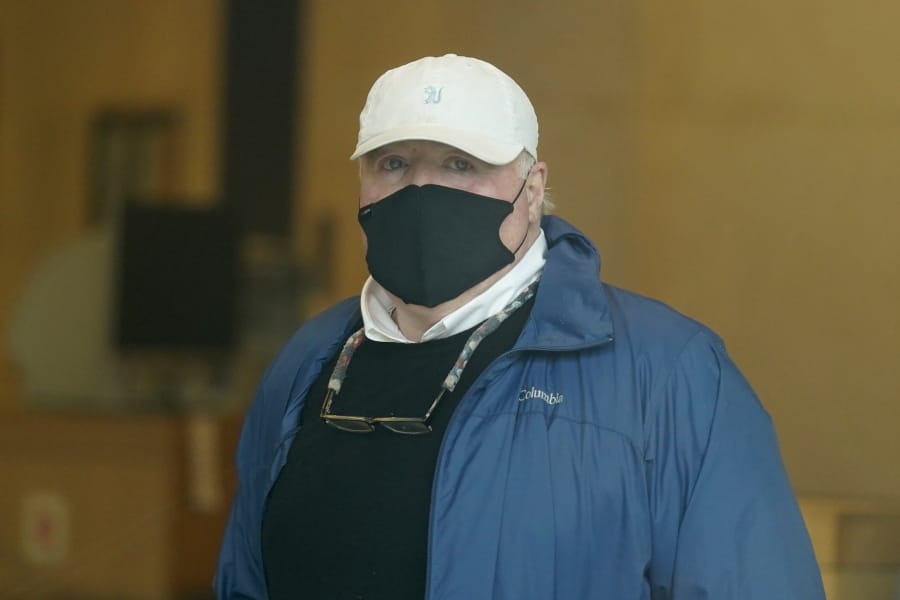Prosecutors announced Friday they were not seeking a new murder trial for Michael Skakel, the nephew of Robert F. Kennedy's widow, Ethel Kennedy. Here is a timeline of key developments in the case:
Oct. 30, 1975: Greenwich teenager Martha Moxley is beaten to death with a golf club, later traced to a set owned by Michael Skakel's late mother. Moxley's battered body is found the next day under a tree on her family's estate. The case is unsolved for 25 years and is the subject of several books.
June 17, 1998: Prosecutors announce that a one-judge grand jury has been appointed to investigate the murder.
Jan. 18, 2000: Arrest warrant issued.
Jan. 19, 2000: Skakel surrenders to police. He is charged as a juvenile because he was 15 at the time of the murder.
March 14, 2000: Skakel is arraigned. He approaches the victim's mother in court and tells her: "You've got the wrong guy."
April 19, 2001: Gregory Coleman, who attended a substance abuse treatment center with Skakel in the 1970s, admits being high on heroin when he testified before the grand jury but stands by his testimony that Skakel said he would get away with murder because "I'm a Kennedy."
June 7, 2002: Skakel is convicted by a panel of 12 jurors in Norwalk Superior Court. Two months later, he is sentenced to 20 years to life in prison.
Aug. 26, 2004: Skakel seeks a new trial based on a claim by Gitano "Tony" Bryant that implicates two men in the murder.
April 12, 2010: Connecticut Supreme Court rejects Skakel's bid for a new trial, ruling a claim implicating two other men was not credible.
Sept. 27, 2010: Skakel files a new appeal of his murder conviction, this time arguing his high-profile trial attorney, Michael Sherman, was incompetent.
Oct. 24, 2012: A state parole board denies his bid for freedom, telling him he could be considered for release again in five years.
April 25, 2013: Skakel, who did not testify at his trial, takes the stand in support of his appeal to argue Sherman did a poor job. He said Sherman took photos of the judge and jury with a pen camera and had him sign an autograph. "I was flabbergasted at the nonchalant attitude," Skakel said.
Oct. 23, 2013: A Connecticut judge grants a new trial for Skakel, ruling his attorney failed to adequately represent him when he was convicted in 2002.
Nov. 21, 2013: Skakel is granted bail as prosecutors appeal the ruling for a new trial. Skakel posts $1.2 million bail and is freed pending appeal.
Dec. 30, 2016: A divided Connecticut Supreme Court reinstates Skakel's conviction. In a 4-3 decision, it rejects a lower court ruling that his trial lawyer didn't adequately represent him. Skakel, then 56, faces a possible return to prison.
Jan. 9, 2017: Lawyers for Skakel ask the Connecticut Supreme Court to reconsider its decision to reinstate his murder conviction -- a request that adds another twist to the case because the justice who wrote the 4-3 majority ruling has left the court.
Feb. 22, 2018: Connecticut Supreme Court rejects a request by prosecutors to revoke Skakel's bail and send him back to prison.
May 4, 2018: Connecticut Supreme Court vacates Skakel's murder conviction 4-3 and orders a new trial, saying defense attorney Michael Sherman failed to present evidence of an alibi.
Jan. 7, 2019: The U.S. Supreme Court refuses to hear the case, leaving in place the decision that vacated the murder conviction.
Oct. 30, 2020: Prosecutors announce they will not seek a second trial for Skakel on the murder charge.



